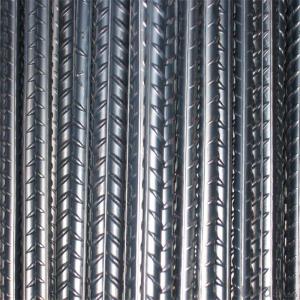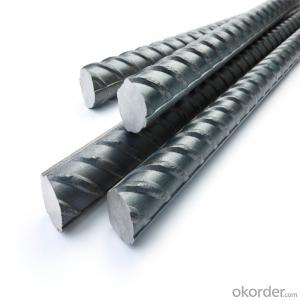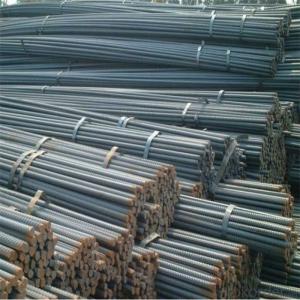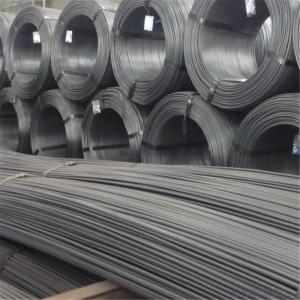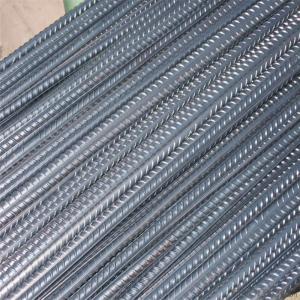SD390 Steel Rebar with JIS Standard
- Loading Port:
- Tianjin
- Payment Terms:
- TT OR LC
- Min Order Qty:
- 160 m.t.
- Supply Capability:
- 500000 m.t./month
OKorder Service Pledge
OKorder Financial Service
You Might Also Like
Item specifice
SD390 Steel Rebar with JIS Standard
Description of SD390 Steel Rebar with JIS Standard
1, Diameter: 5.5mm-10mm SD390 Steel Rebar with JIS Standard
10m- 40mm SD390 Steel Rebar with JIS Standard
2, Length: 6m, 9m, 12m or customized
3, Standard: GB, ASTM, AISI, SAE, DIN, JIS, EN
OEM technology - send detailed technical parameters for accurate quotation.
2, Produce Process: smelt iron - EAF smelt billet - ESR smelt billet -
hot rolled or forged to get the steel round bar and plate
3, Heat Treatment: annealing, normalizing, tempering, quenching
4, Surface Treatment: Black
5, Quality Assurance: We accept third party inspection for all orders.
You can ask testing organizations such as SGS, BV, etc. to test our products before shipping.
Chemical Composition of SD390 Steel Rebar with JIS Standard
Grade | Technical data of the original chemical composition(%) | |||||
Reinforcing steel bar HRB335 | C | Mn | Si | S | P | B |
≤0.25 | ≤1.60 | ≤0.80 | ≤0.045 | ≤0.045 | >0.0008 | |
Physics Capability | ||||||
Yield Strength(N/cm2) | Tensile Strength(N/cm2) | Elongation(%) | ||||
≥ 335 | ≥490 | ≥16 | ||||
Reinforcing steel bar HRB400 | C | Mn | Si | S | P | B |
≤0.25 | ≤0.16 | ≤0.80 | ≤0.045 | ≤0.045 | 0.04-0.12 | |
Physics Capability | ||||||
Yield Strength(N/cm2) | Tensile Strength(N/cm2) | Elongation(%) | ||||
≥ 400 | ≥ 570 | ≥ 14 | ||||
Products Show of SD390 Steel Rebar with JIS Standard
Company Information
CNBM International Corporation is the most important trading platform of CNBM group.
Whith its advantages, CNBM International are mainly concentrate on Cement, Glass, Iron and Steel, Ceramics industries and devotes herself for supplying high qulity series of refractories as well as technical consultancies and logistics solutions.


F A Q
1, Your advantages?
professional products inquiry, products knowledge train (for agents), smooth goods delivery, excellent customer solution proposale
2, Test & Certificate?
SGS test is available, customer inspection before shipping is welcome, third party inspection is no problem
3, Factory or Trading Company?
CNBM is a trading company but we have so many protocol factories and CNBM works as a trading department of these factories. Also CNBM is the holding company of many factories.
4, Payment Terms?
30% TT as deposit and 70% before delivery.
Irrevocable L/C at sight.
5, Trading Terms?
EXW, FOB, CIF, FFR, CNF
6, After-sale Service?
CNBM provides the services and support you need for every step of our cooperation. We're the business partner you can trust.
For any problem, please kindly contact us at any your convenient time.
We'll reply you in our first priority within 24 hours.
- Q:What is the role of cobalt in special steel?
- Due to its unique properties and characteristics, cobalt plays a crucial role in special steel. It serves as a significant alloying element in the production of high-performance steel alloys, particularly those used in demanding applications where strength, hardness, and heat resistance are vital. Cobalt's primary function in special steel is to enhance its overall strength and toughness. By forming a solid solution with iron, cobalt creates a fine-grained microstructure that improves the mechanical properties of the steel. This results in increased hardness, wear resistance, and the ability to withstand high temperatures and harsh environments. Moreover, cobalt improves the steel's resistance to corrosion and oxidation, making it suitable for extreme conditions in industries like aerospace, oil and gas, and automotive. Additionally, it enhances the steel's magnetic properties, making it valuable in electrical and electronic devices. Another essential role of cobalt in special steel is its ability to facilitate the formation of stable carbides. The addition of cobalt aids in the precipitation and dispersion of carbides, contributing to the steel's high-temperature strength and excellent retention of hardness at elevated temperatures. Furthermore, cobalt assists in refining the grain structure of the steel, resulting in improved machinability and surface finish. It also allows for better control over the hardenability of the steel, determining its capacity for heat treatment and achieving desired hardness levels. To summarize, cobalt plays a multifaceted and indispensable role in special steel. It enhances the steel's strength, hardness, and toughness, improves its resistance to corrosion and oxidation, and enables it to withstand high temperatures. Cobalt also aids in refining the microstructure of the steel, enhancing machinability and allowing precise control over its hardenability.
- Q:What are the main factors that determine the cost of special steel?
- The cost of special steel is primarily determined by several key factors. Firstly, the composition of the steel plays a significant role in determining its cost. Special steels often have specific alloying elements added to enhance their properties, such as corrosion resistance, strength, or heat resistance. The cost of these alloying elements can vary widely, and the greater the quantity and complexity of the alloy, the higher the cost of the steel. Secondly, the manufacturing process used to produce the special steel can greatly impact its cost. Special steels often require more intricate and controlled manufacturing processes compared to regular steel. These processes may involve additional steps such as precise heat treatment, forging, or casting, which can increase the overall cost of the steel. Another crucial factor influencing the cost of special steel is market demand and availability. If a particular type of special steel is in high demand but limited supply, the cost tends to rise. Conversely, if there is a surplus of a specific type of special steel, the cost may decrease. Market forces, including global supply and demand dynamics, can significantly impact the cost of special steel. Moreover, the quality and certification of the special steel can also affect its cost. Higher-quality steel that meets stringent industry standards and certifications may often command a higher price due to the additional testing, quality control, and documentation required. Transportation and logistics costs are also important factors to consider. If the steel needs to be transported over long distances or requires specialized handling, it can add to the overall cost. Lastly, economic factors such as currency exchange rates, inflation, and government policies can impact the cost of special steel. Fluctuations in exchange rates can affect the cost of raw materials and manufacturing equipment, which in turn influence the final price of the steel. Government policies, such as import and export tariffs or subsidies, can also impact the cost of special steel. In summary, the main factors that determine the cost of special steel are the composition, manufacturing process, market demand and availability, quality and certification, transportation and logistics, and economic factors. Understanding these factors is crucial for both buyers and sellers of special steel to make informed decisions and ensure competitive pricing.
- Q:What are the requirements for special steel used in energy equipment manufacturing?
- Special steel used in the manufacturing of energy equipment must meet stringent and specific requirements. These steels need to possess certain characteristics that make them suitable for handling the extreme conditions and demands of energy equipment. To begin with, high strength is a crucial requirement for special steel used in energy equipment manufacturing. These steels must have excellent mechanical properties, such as high tensile strength and good toughness. This is necessary to withstand the heavy loads, pressure, and stresses experienced by energy equipment like turbines, generators, and power transmission systems. Additionally, special steels used in energy equipment manufacturing must demonstrate exceptional heat resistance. They must maintain their structural integrity and mechanical properties even at elevated temperatures. This is especially important for components like boiler tubes and heat exchangers, as energy equipment operates under high-temperature conditions. Heat-resistant steels with high melting points and low thermal expansion are therefore essential. Corrosion resistance is another vital requirement for special steel used in energy equipment manufacturing. Energy equipment is often exposed to harsh environments, including corrosive gases, fluids, and high humidity. Therefore, the special steels used should have excellent resistance to corrosion, oxidation, and erosion. This ensures the longevity and reliability of the energy equipment, reducing maintenance and replacement costs. Moreover, special steels used in energy equipment manufacturing should possess good weldability and machinability. Energy equipment often requires complex fabrication processes and weldments. Therefore, these steels should have good weldability to ensure easy and reliable joining. Similarly, machinability is crucial for the production of energy equipment components, as it allows for efficient shaping and finishing. Lastly, special steel used in energy equipment manufacturing must meet strict quality and safety standards. They should adhere to international codes and regulations, such as those established by organizations like the American Society of Mechanical Engineers (ASME) and the International Electrotechnical Commission (IEC). These standards guarantee that the special steels meet the necessary specifications and performance requirements for energy equipment, promoting safety and reliability. In conclusion, the requirements for special steel used in energy equipment manufacturing encompass high strength, heat resistance, corrosion resistance, weldability, machinability, and compliance with quality and safety standards. By meeting these requirements, the special steels can withstand the extreme conditions and demands of energy equipment, ensuring their longevity, reliability, and safety.
- Q:How does special steel perform in forging applications?
- Special steel is highly desirable for forging applications due to its exceptional strength, durability, and resistance to wear and tear. It offers superior performance as it can withstand the intense heat and pressure involved in the forging process without losing its shape or integrity. Additionally, special steel's unique composition allows for precise shaping and intricate designs, making it an ideal choice for complex forging projects.
- Q:How does special steel contribute to reducing product rejection rates in quality control?
- Special steel contributes to reducing product rejection rates in quality control by providing superior strength, durability, and resistance to wear and tear. These properties enable the production of high-quality components and eliminate common defects such as distortion, cracking, or premature failure. Additionally, special steel's precise composition and manufacturing processes ensure consistency and accuracy in the final products, reducing the likelihood of manufacturing errors and subsequent rejection during quality control inspections.
- Q:What are the different alloying elements used in special steel?
- There are various alloying elements used in special steel, including chromium, nickel, molybdenum, vanadium, tungsten, manganese, and silicon, among others. These elements are added in specific quantities to enhance the steel's properties such as corrosion resistance, hardness, toughness, and heat resistance, making it suitable for specific applications in industries like aerospace, automotive, and construction.
- Q:How does special steel resist deformation under load?
- Special steel resists deformation under load due to its unique properties and composition. It is typically made with higher levels of alloying elements such as chromium, nickel, and molybdenum, which enhance its strength, hardness, and toughness. These alloying elements form strong bonds within the steel's crystal lattice structure, making it more resistant to deformation. Additionally, special steels often undergo heat treatment processes such as quenching and tempering, which further refine their microstructure and increase their ability to withstand loads without deforming. Overall, the combination of alloying elements and heat treatment techniques allows special steel to maintain its shape and structural integrity even under high-stress conditions.
- Q:What are the main applications of special steel in the semiconductor industry?
- Special steel is widely used in the semiconductor industry for various applications. One of the main applications is in the manufacturing of wafer handling components such as vacuum chucks, reticle stages, and load ports. Special steel's high strength, corrosion resistance, and precision machining capabilities make it ideal for these critical components that require excellent dimensional stability and reliability. Additionally, special steel is also used in the construction of cleanroom equipment, such as gas cabinets, exhaust systems, and process tools, where its resistance to chemical and thermal stress is highly valued. Overall, special steel plays a crucial role in ensuring the efficiency, accuracy, and safety of semiconductor manufacturing processes.
- Q:What are the main advantages of using special steel in the defense industry?
- The main advantages of using special steel in the defense industry are its exceptional strength, durability, and resistance to wear and tear. Special steel alloys can withstand extreme conditions, such as high temperatures and pressures, making them ideal for military applications. Additionally, special steel offers enhanced corrosion resistance, ensuring the longevity of defense equipment even in harsh environments. Its high impact resistance and ability to absorb shock also make it valuable in protecting soldiers and military vehicles. Overall, special steel provides crucial advantages in terms of reliability, performance, and protection for the defense industry.
- Q:How does special steel contribute to the construction industry?
- Special steel contributes to the construction industry in various ways. Firstly, its high strength and durability make it an ideal material for structural components, such as beams and columns, ensuring the integrity and safety of buildings. Secondly, special steel's resistance to corrosion and extreme weather conditions enhances the longevity of structures, reducing maintenance and replacement costs. Additionally, its versatility allows for innovative designs and efficient construction methods, enabling architects and engineers to push the boundaries of construction possibilities. Overall, special steel plays a crucial role in enhancing the quality, performance, and sustainability of construction projects.
1. Manufacturer Overview |
|
|---|---|
| Location | |
| Year Established | |
| Annual Output Value | |
| Main Markets | |
| Company Certifications | |
2. Manufacturer Certificates |
|
|---|---|
| a) Certification Name | |
| Range | |
| Reference | |
| Validity Period | |
3. Manufacturer Capability |
|
|---|---|
| a)Trade Capacity | |
| Nearest Port | |
| Export Percentage | |
| No.of Employees in Trade Department | |
| Language Spoken: | |
| b)Factory Information | |
| Factory Size: | |
| No. of Production Lines | |
| Contract Manufacturing | |
| Product Price Range | |
Send your message to us
SD390 Steel Rebar with JIS Standard
- Loading Port:
- Tianjin
- Payment Terms:
- TT OR LC
- Min Order Qty:
- 160 m.t.
- Supply Capability:
- 500000 m.t./month
OKorder Service Pledge
OKorder Financial Service
Similar products
New products
Hot products
Related keywords
